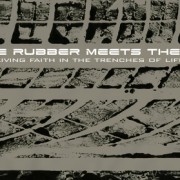Sinkhole
Several years ago, I read Gordon MacDonald’s book “Ordering Your Private World.” He begins by describing sinkholes in Florida. Water aquifers drain leaving a subterranean void that will, without any notice, give way. Suddenly a house sinks into a massive hole; all the while nobody expected it.
A little over a year ago, I fell into one of these sinkholes. It was a Sunday morning and I stood up to preach, as I had done hundreds of times before, but this particular Sunday, I lost control and began to weep. The next five minutes seemed like an eternity as I worked to regain my composure. The church was completely caught off guard (not to mention the fact that Brits have a reputation of holding a stiff upper lip). They had no idea that I had been under such stress. My internal anxiety had been increasing because of a combination of church finances, critics within the church, inability to minister to particular deep needs of people, exhaustion, mounting discouragement, etc. I remembered MacDonald’s sinkhole as I lay in this pit, depressed and lacking in faith. Simply put, I wanted out.
Here are some of the early warning signs that I failed to notice.
- I ceased to have vision for the church and found myself just trying to maintain.
- I viewed myself as the servant, and therefore didn’t give others the opportunity to serve me in my mounting need.
- My times of prayer decreased while my times of anxiety increased.
- I began to use my creativity to look for ways to get out of full-time ministry.
- I internalized my conflicts, rather than sharing with trusted friends/counsellors my struggle and fatigue.
- I had begun to feel like I was a sermon machine, needing to birth a sermon every few days.
- I found that I was being careful not to ruffle feathers of certain critics, seeking their approval instead of God’s approval.
- I had put people’s spiritual needs above my own.
Here are some things that particularly helped.
- I began to put my spiritual needs first. This seems antithetical. I had thought that I had what it took to minister to people. In order to serve others, I need to receive from the Lord. It’s like those pre-flight announcements. If the oxygen mask drops down, put your own mask on before you help your child. If you don’t, you will have no strength to help anyone. 1 Samuel 30:6 tells us that “David strengthened himself in the Lord.” One of the ways I began to do this was to take a monthly day of retreat to pray and seek the Lord. This isn’t for the church, but for my own soul. The great Scottish preacher Robert Murray McCheyne said the best thing he could give his church was his own personal holiness.
- I began sharing my struggles with the church (obviously what is shared requires discretion). One of the reasons for my sinkhole was a lack of help and co-labouring by the church body. Since the church felt I had everything under control, their involvement in the church had become passive. Since I began to humble myself and share my struggles and my perpetual need for God’s grace, the church has become far more active taking on ministry. This has also helped people see that perfection is not the benchmark for ministry, but availability to God is.
- When I’m struggling I tend to isolate and internalize. This is not wise (Proverbs 18:1). I keep in regular contact with other pastors who keep me accountable and who have carte blanche to speak hard truths to me. My wife also, has the same right. When she sees signs, she will challenge me and will exhort me.
- I purpose to serve for the pleasure of Jesus. If I’m pleasing people, my joy or energy rises and falls with their perception. I remind myself that I am already “accepted in the Beloved” (Ephesians 1:6 NKJ). Paul said in Galatians 1:10 that we cannot seek to please men and be Jesus’ servant.
- I began to pray with thanksgiving. This is commanded in Scripture (1 Thessalonians 5:18), but thanksgiving can easily be substituted with grumbling which essentially is an accusation against the Lord.
- I began to say ‘no’ to ministry opportunities. I am free from doing things simply because people want me to do them. My place is not to do everything, but to do what God has called me to do. I pray about the opportunity and ask if this need is a need I am to meet. I am not the saviour; I serve the Saviour.
God is a gracious fountain who never runs dry. These changes have been helpful in keeping my feet from wandering from the fountain of living water.
By the way, we will be away on holiday (vacation) for the next 10 days, so if there are any comments, I may not get to responding to before then.











